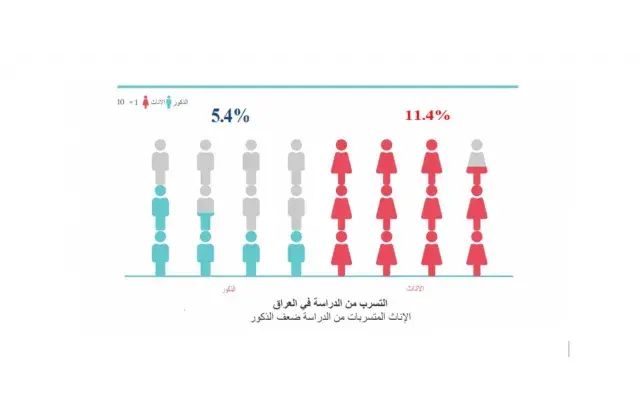Digital Illiteracy… Isolated Iraqi Women From The Outside World

Without any obvious plan from the government to deal with digital literacy: The majority of Iraqi women lag behind the world in catching up with technological developments and thousands of women do not have enough skills to use digital tools due to digital illiteracy…
“I was totally busy with the daily home duties and raising my kids, and now I’m asking my kids to teach me how to use the computer and the Internet.”
With this short phrase, Zainab summarized her digital literacy level, as she spends most of her time in the kitchen managing the house and family, far from anything.
She is now forty-nine years old, a working wife and mother, who has no digital knowledge and only relies on pen and paper in her life, completely isolated from the digital development going on in the outside world.
Zainab talked about her studies at the Administrative Institute and how she did not get an opportunity to learn digital skills and use the computer, at that time the educational staff were not familiar with digital skills
Computers were not available in sufficient numbers for all students in the classroom, in addition to the students’ lack of awareness about the importance of learning to use computers for their lives in particular and professional future in general.
In these circumstances, Zainab finished her studies at the institute, and her relationship with the computer exceeded only glances from afar, without even learning how to operate it or work on it. Thus, she belonged to the category of digital illiterates according to the UNESCO definition of digital illiteracy.
UNESCO defines digital illiteracy as the inability to access, manage, understand, integrate, communicate, evaluate and create information securely and appropriately through the use of digital technology and techniques.
The analytical youth survey data was provided by the Iraqi ministry of planning and the central statistical organization, the data included youth knowledge of using computers in Iraq according to the Iraqi provinces, urban and rural areas and gender in 2019-2020. Iraqi women’s digital skills and their impact on education, age and wealth data was provided by the World Bank and Multiple indicator cluster survey by the Iraqi ministry of planning .
This data shows that Iraqi women’s digital knowledge and skills is the lowest among neighboring countries. It also shows the impact of education on Iraqi women’s technological skills and how thousands of women in Iraq don’t have enough digital skills because of digital illiteracy.
Iraqi Women are Immersed in Absolute Digital Illiteracy
Data from the Ministry of Planning and the Central Statistical Organization show that two out of every eight women in their twenties are illiterates who “cannot read and write,” compared to 3 for the forties category. But what about digital illiteracy, which is one of the most important qualifications of the era.
To answer this question, we analyzed World Bank data about female digital literacy in Iraq, and it turned out that 96 out of every 100 women in Iraq are digitally illiterate and do not know how to use computers, printers, cameras, smart devices, and do not know how to program or use computer programs.
Iraq outperforms in its high rates of digital illiteracy over its neighbors. For every one female out of 100 females in Iraq who can code, there are 11 in Bahrain, five in Qatar, six in the UAE, 12 in Saudi Arabia, and 14 in Kuwait, which has the highest percentage of good coders.
Our analysis also showed that 0 out of every 330 females at the primary school can create a presentation using a computer program versus one in the middle school and 25 girls in the high school in Iraq.
These numbers reflect the reality on the ground that computer education in Iraqi schools starts from the intermediate stage and varies from school to school, which indicates that education has a significant impact on digital literacy.
To find out the level of Iraqi youth’s knowledge of computer skills, we analyzed the data of the survey conducted by the Central Statistical Organization in 2020 on digital literacy among youth in all Iraqi governorates.
It was found that out of every 32 young men and women, there are six who know how to use a computer in Erbil, and five in each of Sulaymaniyah and Dohuk, compared to only one in each of Nineveh and Kirkuk governorates, which have the lowest number among the governorates.
There is no doubt that owning a personal computer will increase the chances of man to raise the level of his digital knowledge, which prompted us to research about the rates of owning digital devices among Iraqi youth.
It turned out that for every one out of 10 young men and women in rural areas who own a computer, there are two in the urban areas, and as for owning a smartphone, for every nine out of 10 young men and women in urban areas who own a smartphone, there are eight in the rural areas.
However, when comparing the percentages of young men and women owning computers with the percentages of their knowledge in using computers in rural and urban areas, we find that only 3 out of every 25 young men and women in urban areas have computer knowledge compared to only 1 in rural areas.
The Actual Impact of Education, Age, and Wealth on Digital Illiteracy
“I don’t want to be digitally illiterate..If there is training that can help me learn digital skills, I will be the first to participate.” This is the hope shared by Wejdan and other digitally illiterate women interviewed by the author of this investigation.
“The computer subject was not among the subjects we learned at the university,” says Wejdan, a 60-year-old retired social researcher. She adds with a tone of sadness and a look of regret, “unfortunately the computer and the Internet did not exist during my study years in 1983.”
“One of the other most important reasons that prompted me to be digitally illiterate at that time, specifically when computers appeared in the market, was the lack of money and poor purchasing power, as it was difficult to own a computer at that time because of its high price and the low income that we, the teaching staff, were getting at the time compared to the price of the computer”.
Like thousands of Iraqi women, Wejdan suffers from digital illiteracy in light of the wars and conflicts that Iraq went through in the nineties, which exhausted its educational structure and its repercussions continue to this day, according to the statements of the media spokesperson in the Ministry of Education, Haider Al-Farouq.
Wejdan’s situation is like the situation of many Iraqi women, which is reflected in their ability to create or write a computer program using any programming language, according to surveys by the Ministry of Planning and the Central Statistical Organization.
None of the girls at the primary school know how to make a computer program using one of the programming languages, while only one in the middle school and 13 in the preparatory stage out of every 330 girls can. This indicates that the more women advance in education, the greater the opportunity for them to learn digital skills such as programming and others.
In addition to this, when comparing the impact of education on women’s skills in terms of how a computer program works using a programming language and women’s ability to make a presentation using presentation programs, we find that zero out of every 330 girls in the primary school can create a presentation using a software program compared to 1 in middle school and 25 in high school in Iraq.
Hence, the impact of wealth on women’s digital ability. Our analysis of World Bank data showed the impact of wealth and economic factors on women’s ability to work or write a computer program using any programming language.
Out of every 330 girls, there is only one in the poor class and only two in the middle-poor class who know how to work a computer program using one of the programming languages, while there are 16 women in the wealthy class.
In other words, the higher the standard of living of the individual, the greater his chance of acquiring digital skills. At that time, the individual becomes financially stable, for example, he can buy a computer, obtain an Internet subscription, or even participate in paid training to acquire digital skills.
Age also had an effect that data analysis showed on women’s ability to make a presentation using the presentation program, as only one out of every 100 Iraqi women in the age group under their twenties knows how to make a computer program using a programming language compared to two in their twenties and one in their thirties And forty years old.
Assistant director general for administrative affairs at the general directorate of educational planning, engineer Mona Khudair, believes that the reasons behind the high rates of illiteracy among women in Iraq are due to social customs and traditions, especially in the rural areas, where the education of girls is limited to a maximum of reading and writing skills.
In addition to the deterioration of the security situation in Iraq, which led to displacement and leaving education behind. And the economic reasons which are related to the low standard of living of the family, where the priority of continuing to study is given to the male not the female.
She also mentioned that not all schools in Iraq are prepared for digital education, and that the computers included only in teaching computer subjects in schools are not sufficient with the number of students in each school.
She said that the digital education project is part of the Ministry of Education, and there are no plans to adopt digital skills education for kindergarten or primary school.
Digital Literacy: Plans Not Yet Seen The Light
An expert on women and technology issues, Hawraa Milani, a Phd candidate in cybersecurity from the University College of London, believes that
“When a woman has the necessary digital skills, this means that she has the ability to communicate her voice and opinion, and that voice or opinion is heard by the world.”
Asking Milani how she would imagine herself if she had no digital skill and what her life would be like. The answer was a picture of the life of another person whom I met every day on the streets of Iraqi cities.
‘’ I believe when I imagine my life without the digital skills and technological means that are currently available will be completely difficult. I will then be a restricted woman who does not have any voice or opinion to express or represent me. Deprived of my independence and the ability to make any progress or success in life, I will then feel completely isolated from the world and rotate around myself in the same place without taking any step forward.
Milani stressed that eliminating the problem of digital illiteracy among Iraqi women is possible. She cited as an example the approach of the UK and some other countries that have established training and workshops and launched special grants for women only, taking into account people who do not have a job and do not have a monthly income.
These countries also took into account married women and women who have children, so that the times of these trainings and workshops are when the children go to school so that all women can participate and benefit. On the other hand, the grants were completely free from the government.
Al-Milani also mentioned the solutions used in some Arab countries, such as the UAE. After alphabetic illiteracy almost disappeared in the Emirates, to less than one woman out of every 100, the country turned to digital literacy.
The UAE has developed a plan based on the country’s adoption of a set of digital programs and workshops in cooperation with specialized companies that helped it achieve tangible results. The country did not exclude any group of society, including women, children and persons with disabilities, within these plans.
It launched the so-called “One Million Arab Coders” initiative to advance Arab societies and provide Arab youth with basic programming skills through online training courses.
These solutions apply to Iraq as well, according to Milani, as the country can make an agreement with a company that can provide technical support and train these women in digital skills. Many large companies wish to invest in Iraq.
On the other hand, Iraq can offer these women some digital means that encourage them to learn. Like a computer, since many large companies change their computers every two years and donate them, why not make an agreement with a company to donate these computers to digital literacy in Iraq.
Milani stressed that there are many solutions that can be implemented in Iraq to eradicate digital illiteracy, and they will certainly be expensive, but these costs are in fact investments for Iraq.
When women obtain the important digital skills that can provide them with a work-from-home opportunity, they will contribute to reducing the unemployment rate and raising the percentage of women working in the tech sector in Iraq, in addition to creating additional income to the country.
However, these solutions and programs depend not only on the will of the government, but also on the will of women for change, as society and women in specific must be aware of the importance and reason for the need to possess digital skills at this time.
Milani also explained that if the country wants to help the women of Iraq, it needs only three things, which is to give the woman a computer, Internet and training, and then the world her oyster.
On the eighth of last September, which coincides with the International Literacy Day, the Iraqi Ministry of Education announced some plans related to the issue of illiteracy and that it is working to open about 1,000 literacy centers with the existence of the illiteracy law which was not properly applied on the ground.
While the ministry did not announce any current or future plans regarding digital illiteracy in Iraq. The Iraqi government must first deal with the problem of educational illiteracy, and then move on to finding solutions with regard to digital illiteracy, as the latter is closely related to educational illiteracy.
Link: https://nirij.org/en/2021/10/17/digital-illiteracy-isolated-iraqi-women-from-the-outside-world/
This article was written by Fatimah Oleiwi and is licensed under CC BY-NC 4.0.






